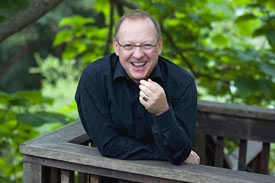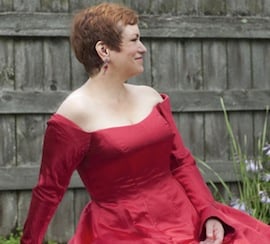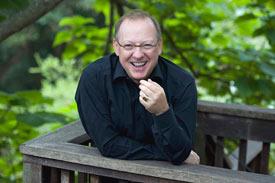
Is there a lover of Baroque vocal music who does not eagerly await Nicholas McGegan’s annual spring jaunt with Handel? What other conductor and Bay Area Baroque ensemble can invest the master’s operas, oratorios, and not so easily classifiable vocal creations with such an irresistible combination of rhythmic verve and sheer delight?
Joining forces with his band of 31 years, the Philharmonia Baroque Orchestra, and rightly favored soprano Dominique Labelle, McGegan is in the midst of presenting concert versions of Handel’s Alexander’s Feast, or The Power of Musick (1736, revised in 1739, 1742, and 1751). This marvelous work, a setting of Newburgh Hamilton’s adaptation of John Dryden’s ode in honor of St. Cecilia (which bears a similar albeit far longer title), is so short by Handelian standards that conductors often follow the composer’s precedent of fattening it up by coupling it with one or more orchestral works. In PBO’s case, McGegan opted for the Concerto Grosso in C Major, HWV 321 “Alexander’s Feast,” which was originally intended as a curtain raiser for the second of Alexander’s Feast’s two parts.
The plot, as it were, is simple. Alexander and the lovely young Thais are at a royal feast in celebration of the warrior’s conquest of Persia. Timotheus, who provides the musical entertainment, soon sees that Bacchus has gotten hold of Alexander’s senses, leading him to fight “all his battles o’er again.” Before Alexander does irreparable harm, Timotheus uses the power of musick to restrain the king. Once his alcoholic tears are stemmed, Alex baby smiles, sighs, and sinks into slumber upon Thais’ ripe breast.
The next morning (Part 2), Timotheus proves that music has powers beyond pacification. Rousing the couple with the golden lyre, he calls for revenge for the Greek soldiers killed by the Persians. The King seizes a flambeau (a flaming torch, not a left over dessert), and Thais leads the way.
What other conductor and Bay Area Baroque ensemble can invest the master’s vocal creations with such an irresistible combination of rhythmic verve and sheer delight?
In the course of a single soprano air and chorus, Persepolis is destroyed. With all video footage of the carnage suppressed, St. Cecilia finally shows up to seal Alexander’s bloodthirsty rampage with inspiration and guidance. The music is so fresh, original, and beautiful that we hardly notice that the horrors of war have been transformed into yet one more impossibly pretty tune.
Sounds to Savor

Although there were three credited vocal soloists (soprano Dominique Labelle, tenor Dann Coakwell, and baritone/bass Philip Cutlip), one un-credited soloist (Celeste Winant), and several star turns by instrumentalists, the evening belonged to McGegan and Labelle.
The soprano, looking radiant in a muted salmon gown that complemented her reddish hair, was in impeccable voice. Her high tones, virtually shorn of vibrato, shone with unblemished purity. Thanks to admirable breath control, Labelle seamlessly produced the long lines of her first air, “With ravish’d ears,” with great power, yet with no apparent effort. With her vocal beauty and shining countenance reigning over the evening as Thais did over Alexander’s senses, she was a joy to listen to.
One of Labelle’s many opportunities for radiant vocalism came in the short arioso, “Softly sweet.” Sounding for all the world like a chirping bird, her high notes soared free. The brief duet with the superb cellist William Skeen was heavenly.
In a subsequent air, the soprano seized the repeated lines “And sigh’d and look’d, sigh’d and look’d / Sigh’d and look’d, and sigh’d again” as opportunities to use eyes and sighs to great effect. How many sopranos can make the same wide-eyed expression over and over again, including in a divinely ornamented da capo, yet only increase the pleasure rather than outstay their welcome? If the play was pure McGegan, Labelle was the ideal muse.
At her side, Coakwell offered a combination of winning albeit somewhat self-satisfied sweetness and mostly convincing bellicosity. His is a fine voice, admirably produced, but his stage persona suggests that he perhaps thinks his character more than feeling it from within.
If the play was pure McGegan, Labelle was the ideal muse.
The hunky Cutlip, limited to only two airs, spent most of his time seated on the side. When he did step front and center, his handsome voice, impressive Baroque coloratura technique, and huge outpouring of energy in the great aria, “Revenge, revenge,” gave no hint that, just last year, he swaggered and swore as murderer Joseph De Rocher in Houston Grand Opera’s worlds apart production of Dead Man Walking.
The Chorus and Other Triumphs
The perfection of sound and blend that Bruce LaMott has achieved with the Philharmonia Chorale must be the envy of early music conductors worldwide. Although basses can occasionally enter with such force as to momentarily sound blustery, all vocal ranges can make consistently heavenly sounds at all volume levels. The chorus “The many rend the skies” was truly triumphant, and “Now strike the golden lyre again” for tenor and chorus astounding in its combination of top volume and Kent Reed’s thunderous timpani.
Paul Avril and Lawrence Ragent’s harmonizing horns were as sublime in the bass air and chorus, “Bacchus, ever fair and young” as were Elizabeth Blumenstock and Lisa Weiss’ violins in the Concerto Grosso in D. Equally outstanding were Hanneke van Proosdij and Kathryn Montoya’s recorders and the entire viola section in the introduction to “Thus long ago,” and John Thiessen’s trumpet solo in “Revenge, revenge.” Winant, a standout in San Francisco Lyric Opera’s recent Little Match Girl Passion, self-effacingly melded beautifully with other vocal soloists in her very brief appearances.
There was one more star: George Frideric Handel. At a time when his Italian operas were falling out of fashion, Handel’s attempt to invent himself anew with Alexander’s Feast yielded a compact masterpiece. At least, that’s how the Philharmonia Baroque Orchestra and Chorale made it sound.

